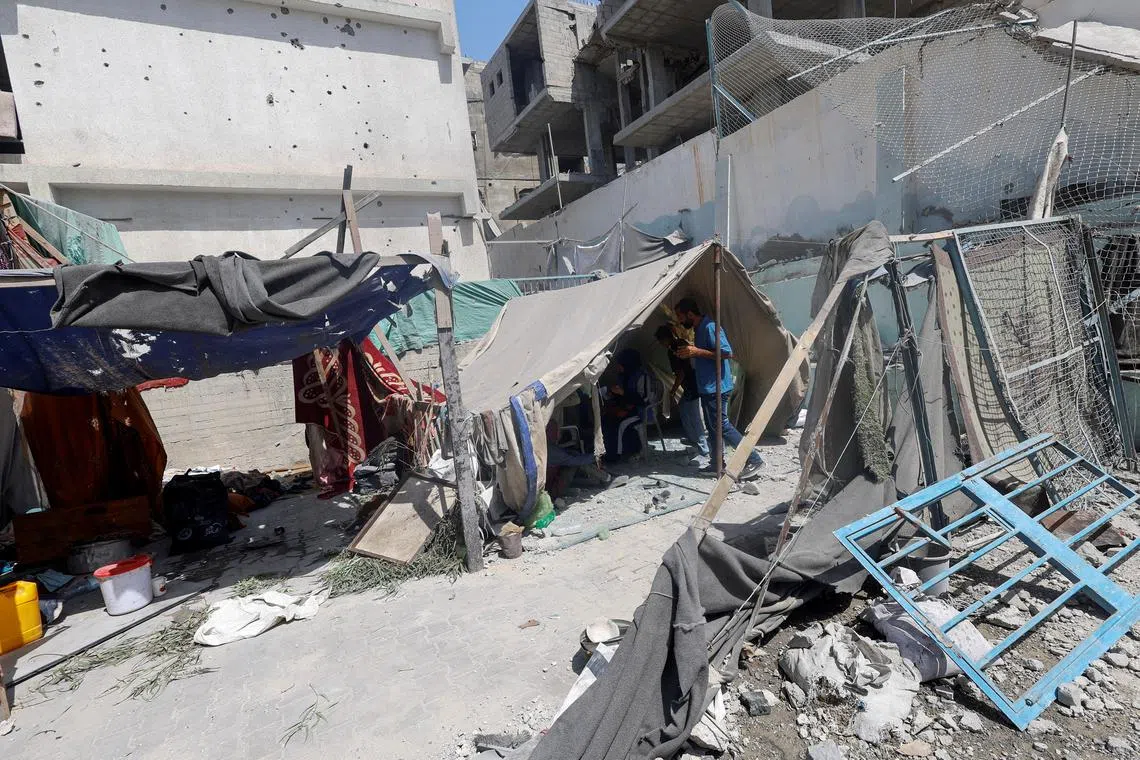Israel weighs Hamas response to Gaza ceasefire proposal as Palestinian death toll crosses 38,000
Sign up now: Get ST's newsletters delivered to your inbox

Tanks shelled several areas on the eastern side of Khan Younis on July 4 after the Israeli army issued evacuation orders on July 2.
PHOTO: REUTERS
CAIRO/GAZA/JERUSALEM – Israeli Prime Minister Benjamin Netanyahu will convene his security Cabinet on the evening of July 4 to discuss new Hamas positions on a ceasefire deal in Gaza, a source in Mr Netanyahu's office said, as fighting in the enclave raged.
Before the Cabinet meets, Mr Netanyahu will have consultations with his ceasefire negotiations team, the source said. US President Joe Biden will also speak to Mr Netanyahu on July 4, a source familiar with the matter told Reuters.
Israel received Hamas' response on July 3 to a proposal made public at the end of May by US President Joe Biden
A Palestinian official close to the mediation effort told Reuters that Hamas, the militant group that controls Gaza, has shown flexibility over some clauses, which would allow a framework agreement to be reached should Israel approve.
Two Hamas officials did not immediately respond to requests for comment. Hamas has said any deal must end the nearly nine-month war and bring a full Israeli withdrawal from Gaza. Israel maintains it will accept only temporary pauses in the fighting until Hamas is eradicated.
The plan entails the gradual release of Israeli hostages still being held in Gaza and the pullback of Israeli forces over the first two phases, as well as the freeing of Palestinian prisoners.
The third phase involves the reconstruction of the war-shattered territory and the return of the remains of dead hostages.
Palestinians cautiously hopeful
In Gaza, Palestinians reacted cautiously ahead of Israel’s response.
"We hope that this is the end of the war, we are exhausted and we can't stand more setbacks and disappointments," said Mr Youssef, a father of two, now displaced in Khan Younis, in the south of the enclave.
"Every (additional) hour into this war, more people die, and more houses get destroyed, so enough is enough. I say this to my leaders, to Israel and the world," he told Reuters via a chat app.
The war in Gaza began when Hamas-led gunmen burst into southern Israel on Oct 7, killed 1,200 people and took around 250 hostages back into Gaza, according to Israeli tallies.
On July 4, Gaza’s Health Ministry said the Palestinian death toll from the war has exceeded 38,000, with 87,445 wounded. The ministry does not distinguish between civilians and fighters in its figures.
An Israeli strike on July 4 hit a school in Gaza City, and the Civil Emergency Service said five Palestinians were killed and others wounded, while other Israeli strikes in Gaza City’s old town the same day killed a woman and wounded several others, medics said.
The Israeli military said it had been operating to dismantle Hamas’ military and administrative capabilities. It said it was acting in accordance with international law and taking feasible precautions to minimise civilian casualties.
Israeli tanks also shelled several areas on the eastern side of Khan Younis on July 4 after the Israeli army issued evacuation orders on July 2, but there has been no movement by the tanks into those areas, residents said.
On July 4, many Palestinians were still seeking shelter following the evacuation order, which also included the border city of Rafah. The United Nations said this was the largest such edict since 1.1 million people were told to leave the north of the enclave in October.
Khan Younis residents said many families slept on the road because they could not find tents.
Israeli planes and tanks also bombed several areas in the northern Gaza areas of Shejaia, Sabra, Daraj and Tuffah, killing several Palestinians, including children, and wounding others, health officials said.
The Israeli military said that its troops and aircraft killed dozens of militants in those areas and in Rafah, in southern Gaza, which Israel has described as Hamas' last stronghold.
Israel’s leaders have said they are winding down the phase of intense fighting against Hamas and would soon move to more targeted operations.
However, after months of conflict, Hamas still claims to have munitions to fight back. On July 4, its armed wing said it had targeted the Israeli operations command headquarters east of Gaza City with missiles.
The group also claimed that its militants were able to fire a Soviet-built anti-aircraft missile towards an Apache helicopter in the sky over the Shejaia neighbourhood, east of Gaza City, without saying if it had been hit.
Israel did not comment on the claims.
The war has created a humanitarian crisis and destroyed the majority of the enclave’s medical facilities.
On July 4, the Gaza Health Ministry said that generators at the Nasser Medical Complex in Khan Younis, the only main hospital still functioning, would run out of fuel within hours and appealed to international humanitarian organisations for help to secure fresh supplies. REUTERS


